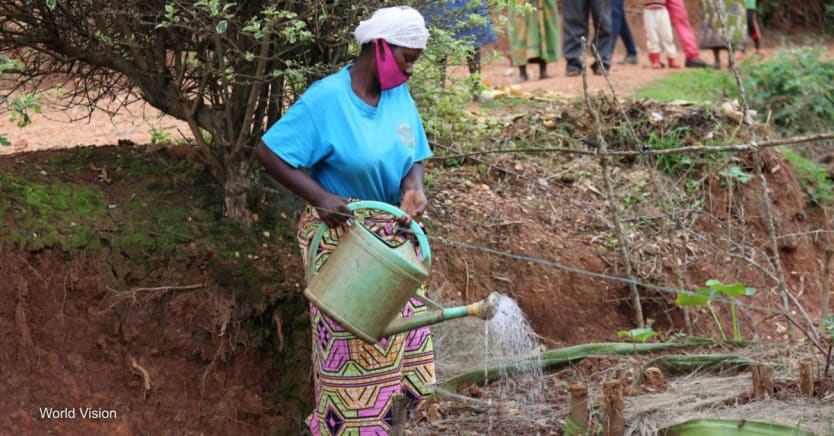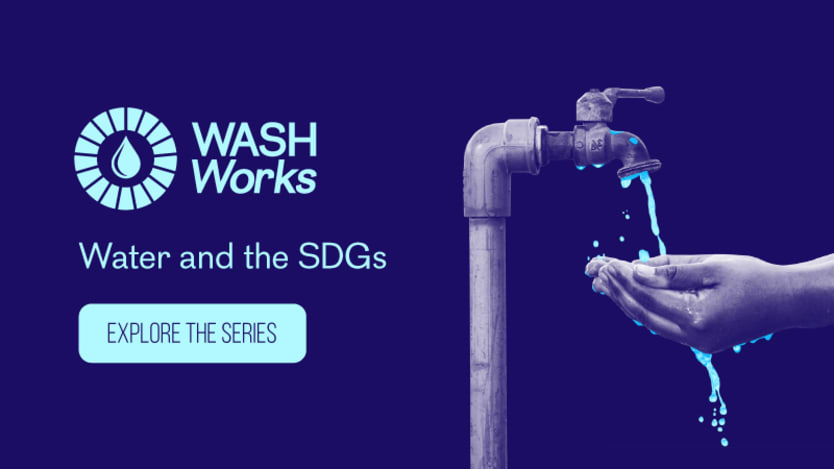
The COVID-19 pandemic has laid bare the large, persistent inequities in access to WASH services based on geography, income, gender, disability, and minority group status. Vulnerable groups have borne the brunt of COVID-19, with a higher likelihood of exposure, severe disease, and secondary impacts. If the push to reach everyone with available and sustainable WASH services by 2030 becomes a competition between implementers to find the lowest hanging fruit, and governments are graded only on aggregate achievements, inequality will only worsen. The Joint Monitoring Program should be applauded for focusing with renewed intensity on inclusive access to WASH services in the Sustainable Development Goals, but equity requires strategic and operational changes by governments, funders, and practitioners alike to ensure that no one is left behind.
Putting the focus on WASH for all
World Vision’s 2021-2025 Global WASH Business Plan considers equity at its very core, aiming to achieve transformative WASH services for the most vulnerable by taking a district-wide universal coverage approach to WASH access. Our goal is to partner with governments to develop more than 300 district plans in 38 countries over the next five years, pushing for safely managed access wherever possible and choosing to open new operating areas only in the areas of highest need. Our current business plan commits us to not go after the lowest hanging fruit — for example, the easiest locations to access or areas where progress may be easier to achieve. Instead, we are using high-resolution population data and GIS to reach the most vulnerable communities.
We all must make a more concerted effort to address long-standing inequalities by advocating for approaches that leave no one behind.
—However, just targeting geographic areas of highest need is not enough. Within every community, there are intersecting issues of vulnerability and exclusion that need to be addressed. Therefore, each new program starts with vulnerability mapping to identify the most marginalized and ensure their meaningful participation in program decision-making and improvement. Such district-wide and inclusive approaches to WASH must be the standard approach in the sector.
What does it mean to put equity at the center?
Equity must be directly promoted through the sector’s programmatic approaches. One way to do this is by deprioritizing hand pumps and working with governments to build larger community water systems that can be extended to bring water closer to the home. Not only does this improve water quality by reducing the need to store water, but it also allows the most vulnerable — especially those with physical disabilities — to have an individual household connection to provide them with equitable water access that a public distribution point might not. Larger systems that allow for household connections are more complex, require a commitment to stronger operation and maintenance systems, and can be more expensive. This increased cost can lead to a perception of lower efficiency by some donors — a false perception that needs to be actively and persistently addressed by development organizations.
Another way World Vision strives for equity is by supporting inclusive local-level advocacy through our Citizen Voice and Action approach, empowering those who might not be prioritized by politicians — for example, rural communities, women and girls, people living with disabilities, minority groups, etc. Amplifying the voices of the marginalized helps to broaden government focus and highlight the need for solutions that work for everyone. Such approaches, combined with inclusive market development that includes a wide array of affordable products and financing options that are responsive to community needs and desires, can lead to truly sustainable WASH services.
Reexamining sources of power and priority setting
Why a water crisis in Cameroon is disproportionately affecting women
A gender-focused water and climate development program is looking for ways to combat the societal effects of dental fluorosis on women in Cameroon.
Funding and management structures within the WASH sector should be examined with an equity lens as well. Too often, donors and organizations led from the global north are the ones articulating the development problems, designing the solutions, and establishing the measures of success. Along the way, voices from the global south may be consulted about the process, but rarely lead it.
As part of World Vision’s WASH approach, rather than allocating funds to programs through tightly controlled grants with donor-driven priorities, most philanthropic WASH funding is invested into national WASH programs as flexible funds, which is then allocated and implemented according to local leadership priorities, in partnership with local governments and communities. Building on this mindset, we are moving from evaluating programs primarily through universities and institutions based in high-income countries to working with local partners in low- and middle-income countries for WASH research with long-term partnerships designed to build capacity. Our Research Equity Initiative specifically explores discrimination faced by junior and senior researchers in LMIC settings to help drive collective action to address systemic causes of inequity within the development sector itself.
Looking inward
In addition, there are significant equity challenges with staffing throughout the WASH sector, from field implementation to global leadership positions. World Vision investigated our own gender equity in WASH staffing across 47 countries, and while women are better represented at the earliest career levels within our teams, leadership quickly becomes male-dominated at more advanced career levels. We have seen some success recently from an intentional focus on building up our own staff, such as a program to support female WASH engineers in Afghanistan and our recent hire of a female global monitoring and evaluation lead who worked her way up through our Kenya office — but we still have improvements to make.
For example, a recent internally-led research project on a Nurturing Care Group program in Ghana asked our female staff about how adeptly the program addressed harmful gender norms at the end of the project. However, it would have been better for these women to have the opportunity to share their views throughout the program development cycle. We are addressing this through applying World Vision’s recently launched Gender Equality and Social Inclusion toolkit.
As we look toward the end of the SDG era and beyond, we all must make a more concerted effort to address long-standing inequalities by advocating for approaches that leave no one behind, promoting local voices by reimagining power structures, and critically considering equity both in our staffing within the sector and in our actual activities. This is not low-hanging fruit — equitable programming requires more thought and can be more expensive and difficult to manage — but only by making significant changes will nationally driven service delivery and emergency response programming improve equity rather than exacerbate long-standing challenges. Progress over the next five years will illuminate whether we are rising to the challenge of the SDGs, or whether we have continued to fail to create a culture in which equity is at the center.
Visit the WASH Works series for more coverage on water, sanitation, and hygiene — and importantly, how WASH efforts intersect with other development challenges. You can join the conversation using the hashtag #WASHWorks.











